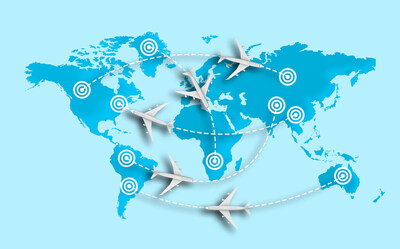Airport slot co-ordination is an intriguing
science; the allocation of slots is highly competitive and the top
slots fiercely guarded. Artemis
Aerospace investigates how airline slots are
apportioned.
WISTON, England, Aug. 13,
2024 /PRNewswire/ -- As you follow a flight
on Flightradar or gaze up at contrails criss-crossing a clear
blue sky, have you ever wondered exactly how aircraft slots are
organised? It may be that you thought it's a global free-for-all,
and that any airline can decide to put on a flight from
Heathrow to Sydney whenever they felt like it, and if they
then change their mind and want to go from Gatwick to Melbourne there's nothing to stop them from
doing that. Well, you'd be wrong – each and every flight worldwide
from a major airport has to stick to its allocated slot.

An airport slot is simply permission to use the airport
infrastructure such as the runway, gates and terminal building, on
specific dates and at specific times to enable an aircraft to take
off or land. Slots are issued under guidelines released biannually
by the International Air Transport Association (IATA) Worldwide
Airports Slots Group after consultation with airlines and other
stakeholders. Their intention is to provide fair access and the
necessary coordination to all airlines and promote safety and
effectiveness at the busiest airports.
In the UK, slots are then allocated by the operator and
airport-funded company Airport Coordination Ltd (ACL), which was
the world's first independent slot coordinator, and which assigns
slots for winter and summer travel.
There are three levels of this coordination:
- Level 1 – no coordination needed as the airport capability is
usually adequate to meet demand.
- Level 2 – coordination is mutually agreed with airlines as
there is potential for congestion at peak times.
- Level 3 – an airport where its ability to handle flights is
considerably exceeded by demand on its services; all airlines and
operators have slot allocations.
IATA holds a conference twice a year to decide on slots which is
attended by over 400 representatives of airports and operators, all
of whom are jockeying for slots which will enable them to grow
their aviation business in the most advantageous way.
As slots are limited and many are in great demand, some airlines
used to acquire them in order to assert their dominance over a
particular route, blocking competition but not actually using them
themselves. This practice was banned by the introduction of a
series of rules, the main one of which is the 80/20 'use it or lose
it' rule. This states that airlines must use at least 80% of their
slot allocation per airport, and if they fail to do this the slot
will be given to another airline. During major global crises such
as the Covid pandemic, however, these rules were temporarily
suspended.
According to IATA, there are more than 200 Level 3 airports
worldwide, and around 50% of all airline passengers depart from a
Level 3 airport, with 35% of all flights operating between two
Level 3 airports.
London Heathrow is the UK's
biggest airport and the fourth busiest in the world, serving nearly
80 million passengers in 2023 – it's also the holder of some of the
most valuable slots in the world. ACL's data for the winter season
2023-2024 shows that British Airways held 4779 slots at
Heathrow, by far the largest
number and over half the total number of slots allocated. In second
place by a very long way comes Virgin Atlantic with 392 slots.
Lufthansa is third with 290, Aer
Lingus fourth with 288, United Airlines fifth with 278 and
American Airlines sixth with 270.
The desirability of a slot can wax or wane depending on the
popularity of a specific destination. Winter and summer travel show
obvious differences, and slots which dovetail neatly with
commercial travellers' needs are always high on the popularity
list. Sometimes more unusual reasons can trigger a slot demand,
such as 'screen tourism' – Aer
Lingus acquired a new slot from Ireland West Airport to
Heathrow after the film 'Banshees
of Inisherin' showcased the beauty of the west of Ireland.
The shortage of slots means that competition is fierce for the
most profitable ones. Although IATA does not promote sale or
bidding wars, it permits airlines to trade slots, or lease them if
they aren't utilising them, as otherwise they would be forfeited.
One legendary trade took place in 2016 when Oman Air bought a pair
of Heathrow slots from Air
France-KLM for US$75 million.
Bargains are also to be had in the wake of global events –
Aeroflot's ban from Heathrow after
the invasion of Ukraine meant a
field day for the six airlines which picked up around 1300
slots.
Slot allocation is intended to prevent delays, safeguard
passengers and ensure the optimum passage of aircraft in and out of
the airport - so when you next glance up and spot an Airbus winging
its way across the sky, think of the complex transactions which
allowed it to get there.
Photo -
https://mma.prnewswire.com/media/2476477/Artemis_Aerospace_Slots.jpg
 View original content to download
multimedia:https://www.prnewswire.com/news-releases/artemis-aerospace-explores-the-history-of-airline-slot-allocations-302215714.html
View original content to download
multimedia:https://www.prnewswire.com/news-releases/artemis-aerospace-explores-the-history-of-airline-slot-allocations-302215714.html
SOURCE Artemis Aerospace